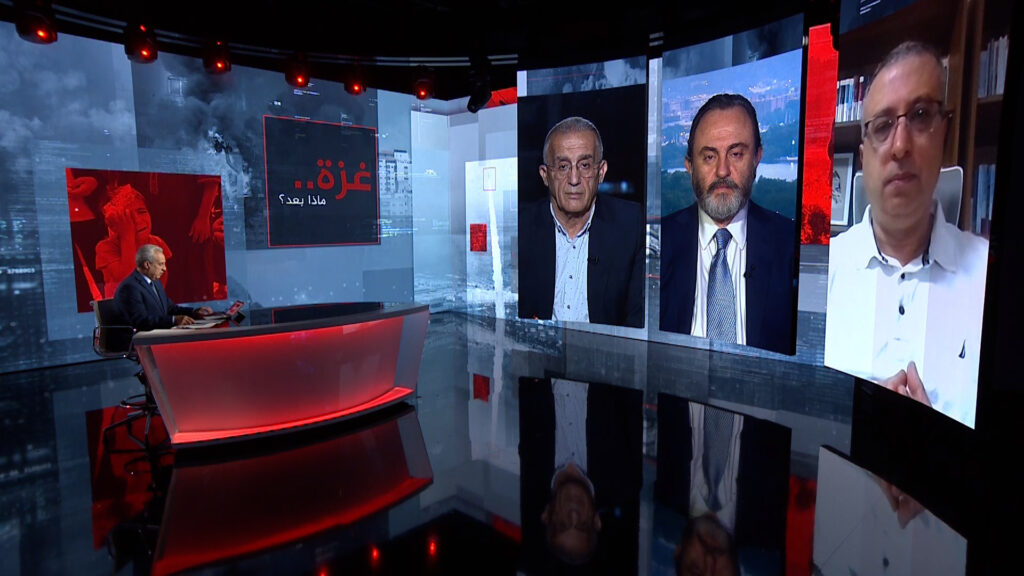Political analysts described Israeli Prime Minister Benjamin Netanyahu’s strategy in the Gaza Strip as scattered and impractical, while some of them suggested that Washington would abandon the path of ceasefire negotiations in support of Tel Aviv.
According to academic and expert on Israeli affairs, Dr. Muhannad Mustafa, Netanyahu has a cohesive government with 64 seats in the Knesset, and it agrees on his goals and policies in Gaza.
However, Mustafa said – during his speech on the program “Gaza… What Next”? – that Netanyahu faces challenges and pressures that were not present at the beginning of the war, as there has become a division over the military operations in Gaza, and they are considered to have exhausted their goals.
He adds that Netanyahu is putting forward scattered political visions that are unrealistic, impractical, and unimplementable, as he is trying to buy time in the war on Gaza, thwart the exchange deal, and continue negotiations at the same time.
The expert on Israeli affairs reveals historical factors that could subjugate Netanyahu, such as the beginning of a military disobedience in the army, as happened in the Second Lebanon War, inferring the existence of the beginning of a currently hidden protest and disobedience by the families of the soldiers in Gaza.
Among the factors also – according to Mustafa – is the position of the Israeli army on the war, in addition to internal pressure in the government, such as Benny Gantz and Gadi Eisenkot threatening to withdraw from the war council, in addition to the fact that the external factor may constitute a pressure factor on Netanyahu.
He concluded that there is a current conflict in Israel between those who want to transform it into a military outpost and armed militias, and those who want to transform it into a liberal democracy, stressing that the Gaza war deepened the dispute over Israel’s identity and goals after the war.
“American abandonment of the negotiation process”
In turn, Dr. Hassan Mneimneh, a researcher at the Middle East Institute in Washington, confirms that Washington is in agreement with Netanyahu regarding the necessity of the Islamic Resistance Movement (Hamas) not ruling the Gaza Strip after the war, adding that it is working to give the world an additional several months until the American elections are held, after which Netanyahu can implement what He wants it.
Mneimneh warns that there is a formal American objection, and Washington is betting on Netanyahu moving to a new stage entitled “Ensuring that Gaza will not be a source of danger after the American elections,” by seizing the Strip after making the necessities of life in it non-existent following the destruction of schools, universities, hospitals and mosques.
He confirms that what Netanyahu is offering in this direction is not a personal issue, but rather an existential and historical issue, before pointing out that the American objections to a certain part “does not mean a shift away from the strict American position on the goals of the war, but rather a conversation about how to achieve the goals of the war.”
According to Mneimneh, Washington wants to eliminate Hamas, make the Gaza Strip not be a source of threat to Israel, recover the prisoners, and then continue the war instead of continuing the war to liberate the prisoners, adding that this is the difference between Israel and America.
According to the spokesman, the American point of view is based on reaching an agreement on Hamas’ readiness to surrender. He expects Washington in the next stage to abandon the negotiating path after its previous goal was to implicate Hamas without its knowledge. It is likely that the coming period will witness Washington’s support for everything Israel proposes.
He predicted Israel’s hardening in the coming years as the right looks to “reclaim Gaza and the West Bank, in addition to eliminating Lebanese Hezbollah, as well as nuclear Iran.”
‘No tactical gains’
In turn, the military and strategic expert, Brigadier General Elias Hanna, said that restlessness began to appear publicly in Israel through some officials submitting resignations, after they had previously been exclusively linked to the formation of an investigation committee following any strategic disaster.
Hanna explains that the Israeli army was unable to achieve and maintain tactical gains in Gaza, and also failed to translate the goals of the war on the ground, adding that this “reflects the wrong Israeli strategy and the resistance strategy that produces results.”
The strategic expert suggested that the occupation army would continue its bombing in order to continue displacing Gazans, pointing out that America’s vision is based on targeting Hamas’ military leadership and its military structure, negotiating the release of prisoners, and then moving to the stage of a sustainable ceasefire and an integrated regional path.
Hanna expects that Israel’s focus will be on controlling the Salah al-Din axis (Philadelphia axis) instead of entering deep into Rafah, before saying that there is agreement in Israel on the grand strategy, which is eliminating Hamas, not the tactics.

